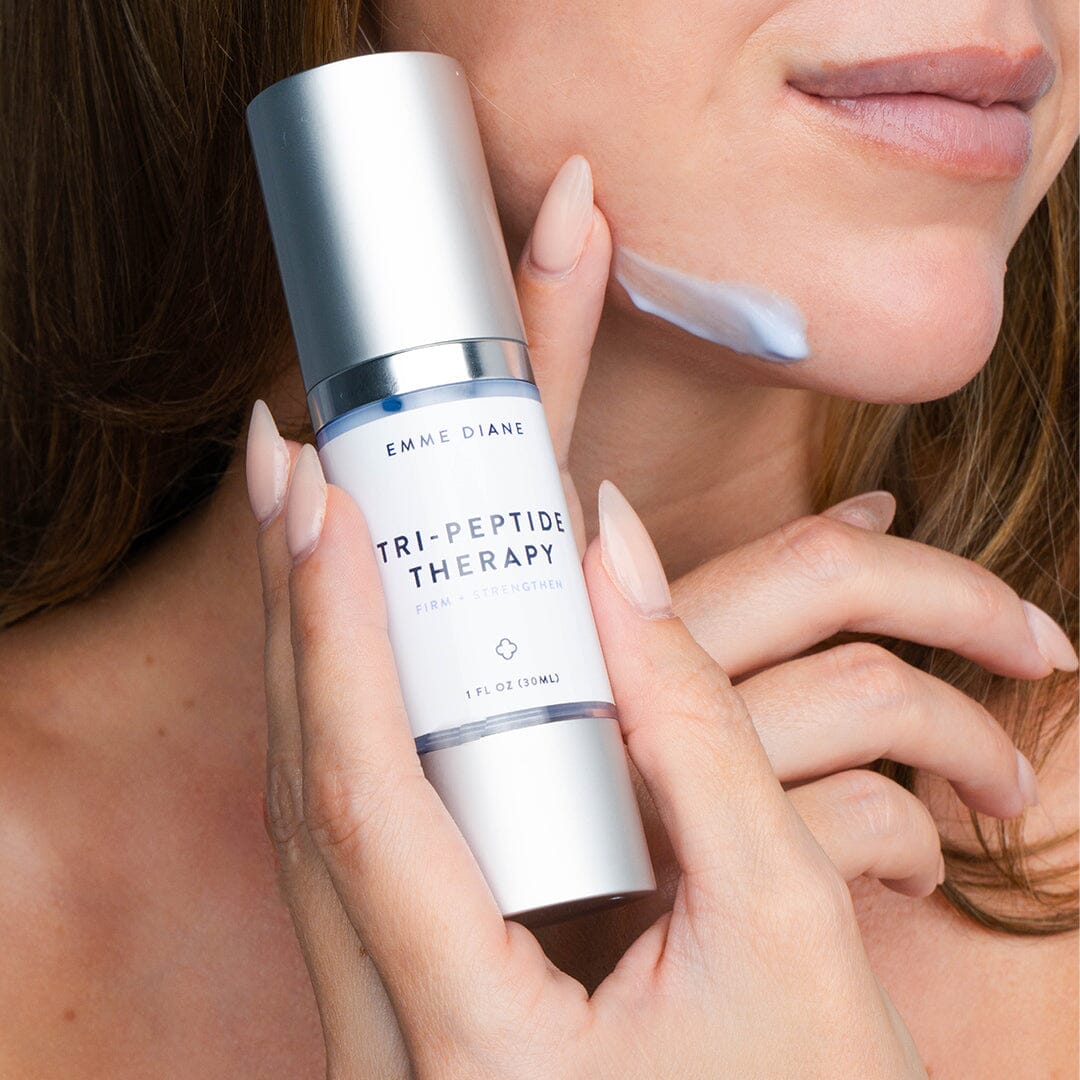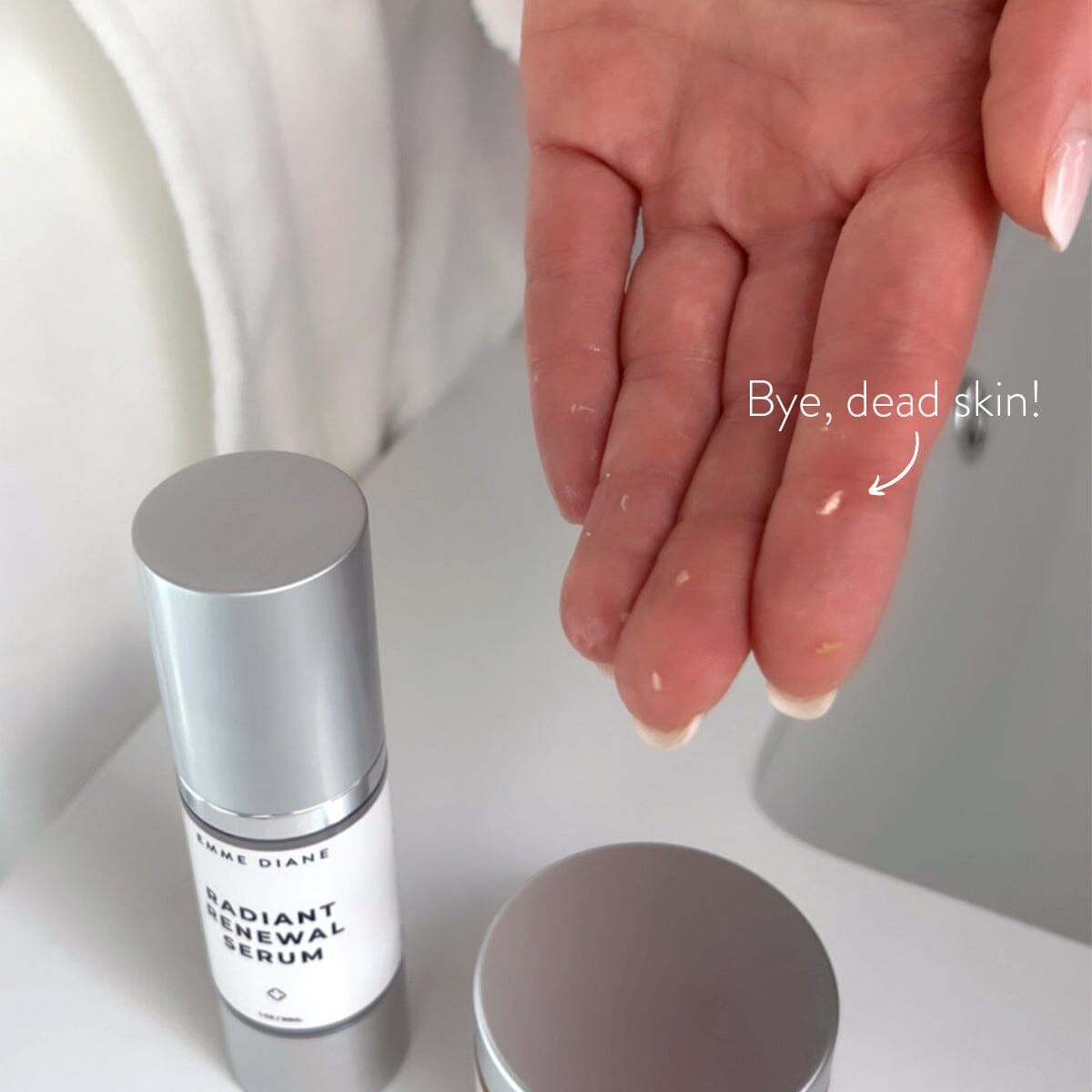Is a Hormonal Imbalance Causing Your Acne?
by Emily Linehan on August 26, 2022
If you’ve struggled with acne, you’ve likely heard a lot of theories as to what the culprit is behind your breakouts. From using makeup with pore-clogging ingredients to consuming acne-triggering foods, there are a lot of different variables that can contribute. While there are several things that can trigger acne, when it comes to adult acne, one of the biggest triggers is hormones or a hormonal imbalance.
What is a Hormonal Imbalance
Hormones play a huge role throughout the body, affecting everything from our metabolism, mood, energy level, development, and more. During puberty, there is an increase in hormone activity, and, since hormones are a trigger for acne, this is why it’s so common for teenagers to experience acne during this time.
Luckily, hormone levels begin to regulate themselves after puberty. In theory, they should fall into a natural rhythm, stopping those surges of specific hormones. It is normal for our hormones to naturally fluctuate at times, like throughout the menstrual cycle. However, sometimes things like stress, birth control use, pregnancy, or certain dietary or lifestyle factors can disrupt your body’s ability to regulate hormones, leading to a hormonal imbalance.
Our hormones tend to work synergistically together, therefore, if our levels of one are too high or low, it likely means others are out of whack as well.
Symptoms of a Hormonal Imbalance
If you’re noticing acne appearing around your chin or jawline at a specific time each month, it’s likely that normal hormonal fluctuations are to blame. However, if you feel there are fluctuations outside of what’s considered normal, it may be a hormonal imbalance. Aside from acne, a hormonal imbalance can present itself as a variety of additional symptoms such as fertility issues, fatigue, digestive issues, mood swings, PCOS, and more.
How Can a Hormonal Imbalance Trigger Acne
As mentioned above, hormones are a trigger for acne. Unfortunately, there isn’t just too much or too little of one hormone to blame. There are several ways a hormonal imbalance can trigger acne, such as -
Too Much Testosterone
Testosterone is a type of androgen (male sex hormones) that is known to be a strong acne trigger. This is because an excess of testosterone causes an overproduction of sticky oil in the pores and increased cell turnover (congestion) which contributes to acne breakouts. While testosterone is a primary aggravating hormone, it’s not always the culprit behind hormonal acne!
Too Little Estrogen
Estrogen is a type of female sex hormone that, among other things, works to balance testosterone. By binding to cell receptors that would otherwise respond to testosterone, estrogen reduces the oil production caused by testosterone, which helps keep pores clear. If there is not enough estrogen, overproduction of sticky oil continues.
Aside from its acne contributions, a lack of estrogen can also cause a decrease in collagen and affect the skin's ability to hold onto water moisture. This can result in the skin becoming dry, thinner, and less supple, as well as make the appearance of fine lines and wrinkles more obvious.
Too Little Progesterone
Among its many roles, progesterone prevents the body from converting testosterone into Dihydrotestosterone, or DHT. DHT is a more potent form of testosterone that can send oil production into overdrive.
Too Much Insulin
While Insulin isn’t typically top of mind, it does play a huge part in hormonal acne. Insulin is produced by the pancreas to help regulate blood sugars. Spikes in insulin cause a burst of inflammation and signals the liver to produce a hormone called IGF-1 (Insulin-like Growth Factor) to help restore balance to your bloodstream. Unfortunately, IGF-1 also increases testosterone, which as we discussed before, can trigger breakouts.
Irregular Cortisol
You may have noticed that during stressful times in your life you seem to break out more. This is no coincidence! Stress greatly affects our hormones, which then affect the skin. When we are stressed out, our endocrine system secretes increased levels of cortisol. During prolonged periods of stress, the body will prioritize the production of cortisol over sex hormones. This often leads to decreased progesterone, which as we mentioned above, can play a role in breakouts.
Additionally, cortisol can lead to insulin spikes, which leads to increased acne through more androgen (testosterone) production.
How to Treat a Hormonal Imbalance
Before you can work to correct a hormonal imbalance, it’s important to troubleshoot the imbalance itself. This is why I highly suggest having your hormones tested by a specialist. They will complete a hormone panel that will help identify if you in fact are experiencing an imbalance, and if so, what the imbalance is. Another option is to complete an at-home test, such as EverlyWell, however, I recommend having the results read by a professional to ensure there is no misinterpretation! Once you have identified any imbalances, here are a few things that may help -
Omit BPAs
Bisphenol A, or BPA, is a hormone disrupting chemical commonly found in plastics. It can affect the body in several ways, one of which being that it is considered a xenoestrogen, or a “fraudulent” estrogen. These fraudulent estrogens mimic the structure and function of the hormone estrogen, meaning they can bind with estrogen receptors. When this happens, the BPA begins taking up space that would have otherwise been utilized by real estrogen, which can lead to a variety of issues such as a hormonal imbalance, like testosterone being the dominant hormone which can lead to hormonal breakouts. To prevent this, try to avoid BPAs as much as possible. They are commonly found in plastics such as water bottles or food containers, plastic wrap, plates and cups. In addition, BPA can also be found in canned goods, soda cans, and even receipts. If you’re unsure of whether your container has BPA, you can check the bottom - BPA-containing plastics typically have the recycling code "7" on the bottom. If you do have to use a BPA-containing plastic, be sure to avoid heating it as the heat can cause more BPA to leach into the food or liquid!
Supplements
I am frequently asked about over-the-counter hormone balancing supplements, such as Diindolylmethane (or DIM for short). While this seems like a reasonable and easy solution, I have found that many of my clients have various hormonal imbalances that are contributing to their breakouts, as discussed above. So, before experimenting with over-the-counter, “one size fits all” supplements, if you believe you have a hormone imbalance, I highly suggest having your hormones tested by a specialist.
Seed Cycling
Seed cycling is a gentle and natural way to balance your hormones throughout the two phases of your menstrual cycle by utilizing the nutrients found in seeds. By boosting estrogen in the first phase and progesterone in the second phase, seed cycling is believed to help relieve symptoms resulting from a hormonal imbalance. Learn more about Seed Cycling for Hormone Balance here.
Be Mindful of Dietary Choices
As we’ve discussed in previous blogs, several foods can be triggers for acne breakouts. Some of the top offenders are those that dramatically impact hormones, such as dairy, alcohol, and caffeine. Dairy naturally contains a cocktail of hormones that, when mixed with our own, can wreak havoc on our skin. Among other things that make dairy so triggering for acne, it also causes an insulin spike that can further increase androgen activity.
Although alcohol consumption does not directly cause acne, it does play a role in several processes throughout the body that can make your skin more susceptible to acne and other issues. Specifically pertaining to hormones, when alcohol is consumed it interferes with the portion of your brain that signals hormone production, leading to an imbalance of hormones linked to the development of acne.
To learn more about foods that may trigger acne, I highly recommend reviewing our blog ‘Are These Foods Triggering Your Acne?’.
Aside from consuming specific foods, your eating habits can also affect your hormones. For example, intermittent fasting has been linked to hormone disruption in women [1]. Estrogen, cortisol, and thyroid hormones are all possible imbalances to be aware of when it comes to intermittent fasting. Because of this, it may not be ideal for women who are still getting their cycle. However, for men and menopausal women, it can be great.
In addition, under-eating can cause the body to stop producing as much estrogen and progesterone (which fight acne in the right dose), and instead produce the acne-causing stress hormone DHEA-S.
Choose Your Workouts Carefully
You may be surprised to learn that some of your healthy habits are actually acne culprits! If you’re an existing client, you likely already know the importance of washing your face within 5 minutes of working out. Aside from making sure you don’t hang out in sweaty skin, your workout choice is also worth considering.
High-Intensity Interval Training, or “HIIT”, workouts can be especially hard on women's hormones. This is because the adrenaline output can lead to spikes in cortisol, which as we discussed above, can have a domino effect on hormone imbalances. Other workouts, such as heavy weight training, can also affect hormones through an increase in testosterone.
It’s important to keep in mind that balance is key when it comes to working out. Instead of completing 5 HIIT workouts a week, try alternating between swimming, yoga, hiking, pilates, or other types of workouts to help protect the adrenals and balance hormones.
xoxo, Emme
Disclaimer: This information is for educational purposes only and does not take the place of medical advice. These statements are not intended to diagnose, treat, cure, or prevent any disease. You should always consult with a healthcare professional before starting any health plan or taking supplements.
Citations
[1] Kumar S, Kaur G. Intermittent fasting dietary restriction regimen negatively influences reproduction in young rats: a study of hypothalamo-hypophysial-gonadal axis. PLoS One. 2013;8(1):e52416. doi:10.1371/journal.pone.0052416


